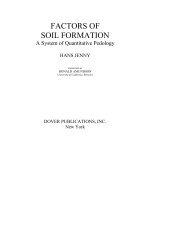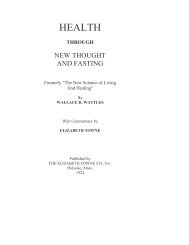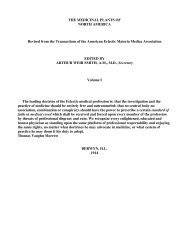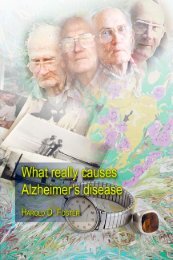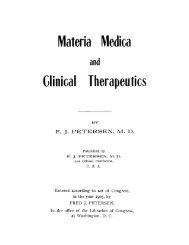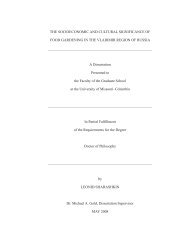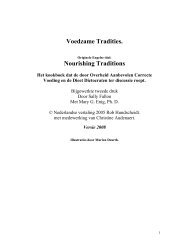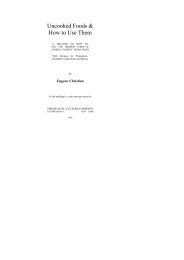historical and scientific perspectives on the health of canada's first ...
historical and scientific perspectives on the health of canada's first ...
historical and scientific perspectives on the health of canada's first ...
Create successful ePaper yourself
Turn your PDF publications into a flip-book with our unique Google optimized e-Paper software.
into modern times. Throughout <strong>the</strong> last century <strong>the</strong>ir socio-ec<strong>on</strong>omic status has closely paralleled<br />
that <strong>of</strong> First Nati<strong>on</strong>s people living <strong>on</strong> reserve.<br />
The systematic removal <strong>of</strong> Métis People from <strong>the</strong> l<str<strong>on</strong>g>and</str<strong>on</strong>g>s <strong>the</strong>y traditi<strong>on</strong>ally occupied resulted in<br />
<strong>the</strong> destabilizati<strong>on</strong> <strong>of</strong> Métis self-governing processes, interrupti<strong>on</strong> <strong>of</strong> <strong>the</strong>ir traditi<strong>on</strong>al knowledge<br />
patterns, <str<strong>on</strong>g>and</str<strong>on</strong>g> oppressi<strong>on</strong> <strong>of</strong> Métis culture <str<strong>on</strong>g>and</str<strong>on</strong>g> language. Although <strong>of</strong> mixed heritage, Métis<br />
people have suffered effects similar to o<strong>the</strong>r Aboriginal peoples as a result <strong>of</strong> <strong>the</strong> col<strong>on</strong>izati<strong>on</strong> <strong>of</strong><br />
Canada <str<strong>on</strong>g>and</str<strong>on</strong>g> subsequent devaluati<strong>on</strong> <strong>of</strong> Aboriginal cultures <str<strong>on</strong>g>and</str<strong>on</strong>g> knowledge systems.<br />
Métis Portaging Trade Goods NWT<br />
Their mixed traditi<strong>on</strong>s <str<strong>on</strong>g>and</str<strong>on</strong>g> comm<str<strong>on</strong>g>and</str<strong>on</strong>g> <strong>of</strong> both<br />
European <str<strong>on</strong>g>and</str<strong>on</strong>g> First Nati<strong>on</strong> languages, led to<br />
<strong>the</strong>ir role as logical intermediaries in <strong>the</strong><br />
commercial relati<strong>on</strong>ship between two<br />
civilizati<strong>on</strong>s. C<strong>on</strong>sequently, as a people <strong>the</strong>y<br />
were heavily involved in fur trading activities,<br />
which inevitably led to <strong>the</strong>ir widespread<br />
dependency <strong>on</strong> denatured foodstuffs, <str<strong>on</strong>g>and</str<strong>on</strong>g><br />
alcohol which were obtained for trading<br />
services, or by barter <str<strong>on</strong>g>and</str<strong>on</strong>g> a corresp<strong>on</strong>ding<br />
ab<str<strong>on</strong>g>and</str<strong>on</strong>g><strong>on</strong>ment <strong>of</strong> living <strong>of</strong>f <strong>the</strong> l<str<strong>on</strong>g>and</str<strong>on</strong>g>. This greatly<br />
c<strong>on</strong>tributed to <strong>the</strong>ir experiencing <strong>the</strong> same range<br />
<strong>of</strong> devastating infectious, degenerative, <str<strong>on</strong>g>and</str<strong>on</strong>g><br />
social diseases as <str<strong>on</strong>g>historical</str<strong>on</strong>g>ly occurred am<strong>on</strong>g<br />
<strong>the</strong>ir First Nati<strong>on</strong> cousins, <str<strong>on</strong>g>and</str<strong>on</strong>g> later <strong>the</strong> Inuit.<br />
By <strong>the</strong> end <strong>of</strong> <strong>the</strong> nineteenth century, most western Métis could be found living <strong>on</strong> <strong>the</strong> margins <strong>of</strong><br />
both First Nati<strong>on</strong> <str<strong>on</strong>g>and</str<strong>on</strong>g> Euro-Canadian societies. Many lived <strong>on</strong> l<str<strong>on</strong>g>and</str<strong>on</strong>g>s adjacent to First Nati<strong>on</strong><br />
reserves, <str<strong>on</strong>g>and</str<strong>on</strong>g> although most held str<strong>on</strong>g ties <strong>of</strong> kinship with people <strong>on</strong> <strong>the</strong> reserve, <strong>the</strong>y were<br />
denied treaty <str<strong>on</strong>g>and</str<strong>on</strong>g> o<strong>the</strong>r benefits <str<strong>on</strong>g>and</str<strong>on</strong>g> services because <strong>of</strong> <strong>the</strong>ir ambiguous legal status. O<strong>the</strong>rs<br />
lived al<strong>on</strong>g road allowances <strong>on</strong> <strong>the</strong> outskirts <strong>of</strong> Euro-Canadian settlements, <str<strong>on</strong>g>and</str<strong>on</strong>g> were c<strong>on</strong>sidered<br />
squatters <strong>on</strong> provincial l<str<strong>on</strong>g>and</str<strong>on</strong>g>s. The more nor<strong>the</strong>rn Métis settlements like those in <strong>the</strong> south were<br />
impoverished, <str<strong>on</strong>g>and</str<strong>on</strong>g> infectious diseases, particularly tuberculosis <str<strong>on</strong>g>and</str<strong>on</strong>g> syphilis became rampant.<br />
Today, Métis People have nei<strong>the</strong>r treaties, nor a l<str<strong>on</strong>g>and</str<strong>on</strong>g> base within Canada. Most Métis People are<br />
disbursed across <strong>the</strong> country, living in urban, nor<strong>the</strong>rn <str<strong>on</strong>g>and</str<strong>on</strong>g> rural public communities. One<br />
excepti<strong>on</strong> to this is found in nor<strong>the</strong>rn Alberta. In 1932, <strong>the</strong> Government <strong>of</strong> Alberta set aside a<br />
modest l<str<strong>on</strong>g>and</str<strong>on</strong>g> base for <strong>the</strong> Métis <strong>of</strong> <strong>the</strong> regi<strong>on</strong>, now comprising eight communities known<br />
collectively as <strong>the</strong> Métis Settlements <strong>of</strong> Alberta. 46<br />
1.7 HISTORICAL OVERVIEW OF MEDICAL SERVICES TO CANADA’S FIRST PEOPLES<br />
The process <strong>of</strong> dealing with Aboriginal title <str<strong>on</strong>g>and</str<strong>on</strong>g> rights through formal treaty agreements began<br />
shortly after c<strong>on</strong>tact was established between Europeans <str<strong>on</strong>g>and</str<strong>on</strong>g> Aboriginal peoples <strong>of</strong> North<br />
America. These <strong>first</strong> agreements, <strong>the</strong> Peace <str<strong>on</strong>g>and</str<strong>on</strong>g> Friendship treaties, were c<strong>on</strong>cluded during a<br />
period <strong>of</strong> extended warfare between Engl<str<strong>on</strong>g>and</str<strong>on</strong>g> <str<strong>on</strong>g>and</str<strong>on</strong>g> France. They were intended to secure <strong>the</strong><br />
neutrality or assistance <strong>of</strong> <strong>the</strong> Aboriginal nati<strong>on</strong>s in exchange for a commitment not to impede<br />
<strong>the</strong>m in <strong>the</strong>ir traditi<strong>on</strong>al pursuits. Several <strong>of</strong> <strong>the</strong>se treaties were c<strong>on</strong>cluded by <strong>the</strong> British Crown<br />
16




